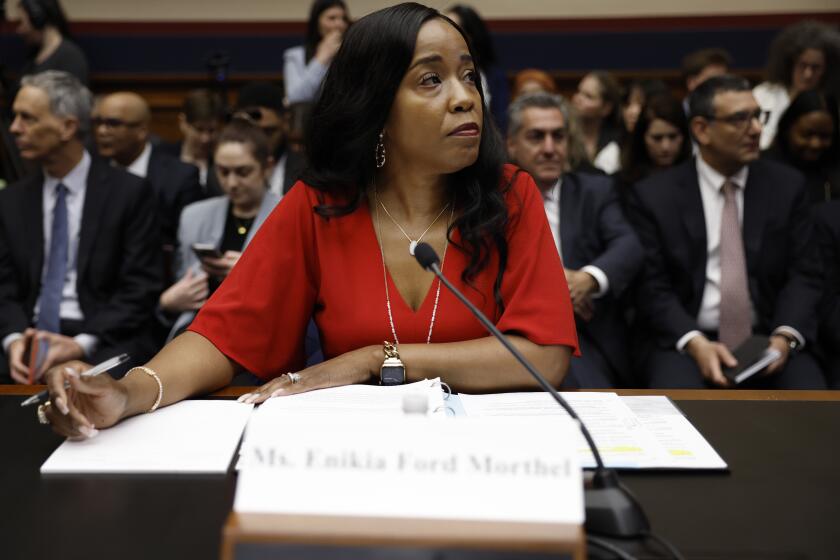Gephardt Assails Dean Record on Medicare
Rep. Richard A. Gephardt on Friday accused Howard Dean of supporting efforts by the Republican Congress to scale back Medicare during the mid-1990s, significantly escalating recent attacks on the former Vermont governor by his rivals in the Democratic presidential race.
“As Democrats, we need a nominee who is clearly different from George Bush on protecting our seniors from deep cuts to Medicare, and on privatizing Medicare,” Gephardt (D-Mo.) said in a speech to a Teamsters local in Des Moines. Gephardt’s campaign made a copy of his prepared remarks available in Washington.
In the last two weeks, Dean has been lashed by virtually all the other major Democratic contenders on several fronts -- from his views on Israel and international trade to his support for repealing all of President Bush’s tax cuts and his claim to be the sole Democratic contender to speak about racial issues to white audiences.
The increased heat has come amid polls showing Dean ahead in Iowa and New Hampshire -- the crucial early contests in the nominating process -- and indications from his campaign that he expects to raise more than $10 million in the reporting period that ends Sept. 30, which would likely dwarf what the other Democrats garner.
Gephardt’s speech targeted a central element of Dean’s campaign: his contention that among the major Democratic contenders, he would most aggressively confront Bush. Gephardt’s charge also challenged Dean’s commitment to the Democratic priority of protecting Medicare and Social Security.
Dean issued a statement denouncing Gephardt for “engaging in name-calling, guilt by association and scare tactics.”
In his remarks, Gephardt depicted Dean as a supporter of efforts by the Republican congressional majority to retrench Medicare spending and increase the program’s reliance on health maintenance organizations during the epic budget showdowns between the GOP and then-President Clinton during the mid-1990s.
“In the midst of the so-called Republican Revolution, Howard Dean actually agreed with the Gingrich Republicans,” Gephardt charged, referring to the controversial House speaker of that time, Newt Gingrich of Georgia. “[Dean’s] home state newspaper reported time and again how Howard Dean supported turning Medicare into a managed-care program.”
To drive his argument home, Gephardt used one of the most popular applause lines in Dean’s stump speech: the former governor’s declaration that he represents the “Democratic wing of the Democratic Party.”
“1995 was the time for the Democratic wing of the Democratic Party to stand up and be counted,” said Gephardt, the former House minority leader. “I led House Democrats as we joined with President Clinton -- and we stopped the Medicare cuts and forced the Republicans to abandon the government shutdown.”
In his response, Dean said: “No Democrat in the presidential race bears any resemblance to Newt Gingrich on any major issue. And for Dick Gephardt to suggest otherwise is simply beyond the pale.”
Dean’s statement did not respond to the substance of Gephardt’s charges and his campaign did not dispute the accuracy of the statements Gephardt cited. But Joe Trippi, Dean’s campaign manager, said that Dean’s goal in advocating changes in Medicare during the mid-1990s was to safeguard the program by securing its long-term solvency.
“All of those ideas from any Democrat, particularly from any Democrat in this race, were out of the motivation for one thing and one thing only: to save Social Security and Medicare,” Trippi said. “There were another group of people led by Newt Gingrich trying to destroy [those programs]. To associate any Democrat with Newt Gingrich on this is below the belt.”
The intensifying assaults on Dean seem designed to serve two purposes. On one level, the other candidates are trying to tarnish Dean’s appeal to particular party constituencies.
Attacks by Sen. Joe Lieberman of Connecticut on Dean’s recent comment that the United States should take a more evenhanded role in the Israeli-Palestinian dispute could reduce the former governor’s support among Jews. Gephardt’s focus on Medicare could hurt Dean among seniors.
But whatever the subject, Democratic strategists say the critical barrage shares the common goal of shaking the image Dean has cultivated as a “candid outsider” and raising doubts about whether he is ready to be president.
It’s the type of counterattack that virtually every effective insurgent candidate -- from former Sen. Gary Hart (D-Colo.) in 1984 to former Sen. Bill Bradley (D-N.J.) in the 2000 primaries -- has faced after initial success.
“It’s not so much that they are trying to pigeonhole him on any one issue,” said a veteran strategist advising one of Dean’s rivals, “as much more of an effort to say this guy is not up to being president and he’s not who he says he is.”
Another Democratic presidential candidate -- Sen. John F. Kerry of Massachusetts -- took Dean to task Friday over a single word. In comments on CNN earlier this week, Dean referred to Hamas “soldiers” as he discussed the Islamic group responsible for many terrorist attacks against Israelis. Kerry issued a statement saying Dean had insulted “the memory of every innocent man, woman, and child killed by these suicidal murderers. Hamas militants are not soldiers in a war -- they are terrorists who need to be stopped.”
In making its case Friday, Gephardt’s staff provided a series of quotes from newspaper and television interviews in which Dean expressed support for cutting Medicare and Social Security to balance the federal budget. In several of the comments, Dean said that if Congress placed the two giant programs -- as well as defense spending -- off-limits for cuts, programs that benefit the states would face excessive reductions.
For instance, the Gephardt campaign quotes Dean as saying on CNN in February 1995: “My problem is this. There have been a lot of statements up on Capitol Hill that say ‘We’re not going to touch Social Security; we’re not going to touch Medicare; we’re not going to touch veterans’ benefits; we’re not going to touch defense. We may add to defense.’ Well, then, you’re going to stick all the cuts on the programs, as you well know, that go to the states.... “
The Gephardt campaign produced news articles reporting Dean praising congressional Republicans for trying to reduce the growth in Medicare spending and others expressing support for increasing Medicare’s reliance on managed care.
Gephardt’s staff also unearthed comments in which Dean, a physician before becoming a full-time politician, expressed more fundamental dissatisfaction with Medicare, which provides health benefits to nearly 40 million seniors.
For instance, in his 1992 state of the state address as governor, Dean said: “We already have a national health care system in this country for those over 65. It’s called Medicare, and it is one of the worst-run programs in this country, both for the patients and the doctors. Medicare is a potent example of why the federal government must not be allowed to run national health insurance.”
More to Read
Get the L.A. Times Politics newsletter
Deeply reported insights into legislation, politics and policy from Sacramento, Washington and beyond. In your inbox three times per week.
You may occasionally receive promotional content from the Los Angeles Times.






